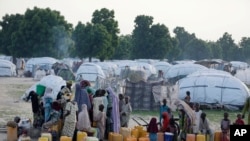The charity Doctors Without Borders says insecurity caused by the Boko Haram conflict has put more than a million Nigerians beyond the reach of humanitarian workers.
The aid group, known by its French acronym MSF, reports the population of northeast Nigeria is being victimized by all sides in the Boko Haram conflict, which has been going on for 11 years.
The Nigerian military says it has the upper hand over the Islamist insurgents but according to MSF and U.N. agencies, the humanitarian situation is still dire, especially in Borno state.
Luis Eguiluz, who headed the agency’s mission in Nigeria for the past two years, says peoples’ movements are limited by the two main Boko Haram factions and the
government, depriving them of their traditional ways of life.
He says people are subject to attacks, abductions, abuse and exploitation; women and girls are victims of rape and other forms of sexual assault.
"We are talking about one of the most or biggest humanitarian crises of the last decades. Seven-point-one million people in need are dependent on humanitarian assistance for survival. They depend upon the most basic needs and services; food, water, health, shelter,” Eguiluz said.
He says despite insecurity, humanitarian workers can reach the majority of the people.
But Eguiluz told VOA that MSF and other agencies have no access at all to the 1.2 million people living in areas controlled by Boko Haram’s largest faction, the one allied with Islamic State.
According to recent U.N. figures, these Nigerians live in 22 enclaves in Borno state.
Equiluz says the Nigerian army does not allow humanitarian agencies to go to these areas because this would be in violation of international counterterrorism laws.
"These counterterrorism laws prevent humanitarian actors to negotiate with all actors, parties in conflict because they are considered terrorists. So, to collaborate with a terrorist is making you a terrorist," he said.
Equiluz notes these laws are preventing access because negotiating with armed groups is considered a crime.
MSF is calling on the Nigerian government to allow international humanitarian law to supersede the one on counterterrorism. This, he says, would enable humanitarian agencies to get access to the 1.2 million Nigerians in desperate need of aid.




